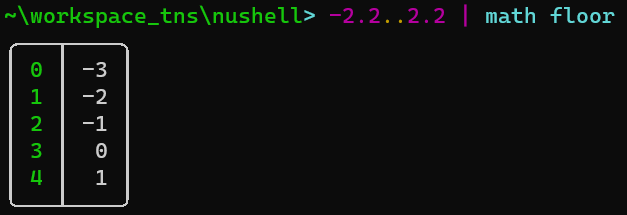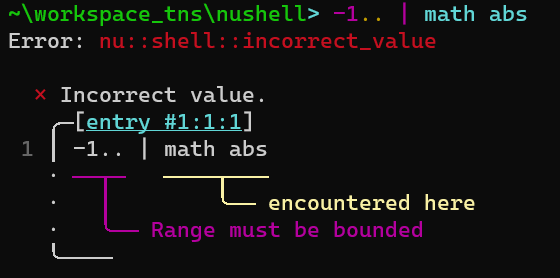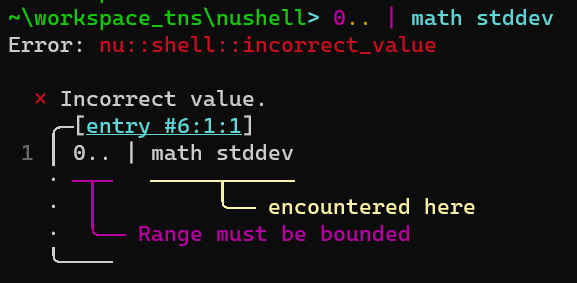mirror of
https://github.com/nushell/nushell.git
synced 2025-07-18 23:24:28 +02:00
No associated issue, but follows up #15135. See also discussion on [discord](https://discord.com/channels/601130461678272522/1349139634281513093/1349139639356624966) with @sholderbach # Description ### Math commands `range -> list<number>` This enables the following math commands: - abs - ceil - floor - log - round to work with ranges. When a range is given, the command will apply the command on each item of the range, thus producing a list of number as output. Example  The commands still do not work work with unbounded ranges:  And I left out the "mode" command because I think it does not make sense to use it on ranges... ### Math commands `range -> number` This was the topic of my previous PR, but for whatever reason I didn't do `math variance` and `math stddev`. I had to use `input.try_expand_range` to convert the range into a list before computing the variance/stddev.  And same, does not work in infinite ranges:  ### Also done: - find link in documentation # User-Facing Changes - Command signatures changes - ability to use some commands with unbounded ranges - ability to use variance and stddev with bounded ranges # Tests + Formatting Cargo fmt and clippy OK Tests OK # After Submitting I guess nothing, or maybe release notes?
166 lines
5.2 KiB
Rust
166 lines
5.2 KiB
Rust
use crate::math::utils::run_with_function;
|
|
use nu_engine::command_prelude::*;
|
|
|
|
#[derive(Clone)]
|
|
pub struct MathVariance;
|
|
|
|
impl Command for MathVariance {
|
|
fn name(&self) -> &str {
|
|
"math variance"
|
|
}
|
|
|
|
fn signature(&self) -> Signature {
|
|
Signature::build("math variance")
|
|
.input_output_types(vec![
|
|
(Type::List(Box::new(Type::Number)), Type::Number),
|
|
(Type::Range, Type::Number),
|
|
(Type::table(), Type::record()),
|
|
(Type::record(), Type::record()),
|
|
])
|
|
.switch(
|
|
"sample",
|
|
"calculate sample variance (i.e. using N-1 as the denominator)",
|
|
Some('s'),
|
|
)
|
|
.allow_variants_without_examples(true)
|
|
.category(Category::Math)
|
|
}
|
|
|
|
fn description(&self) -> &str {
|
|
"Returns the variance of a list of numbers or of each column in a table."
|
|
}
|
|
|
|
fn search_terms(&self) -> Vec<&str> {
|
|
vec!["deviation", "dispersion", "variation", "statistics"]
|
|
}
|
|
|
|
fn is_const(&self) -> bool {
|
|
true
|
|
}
|
|
|
|
fn run(
|
|
&self,
|
|
engine_state: &EngineState,
|
|
stack: &mut Stack,
|
|
call: &Call,
|
|
input: PipelineData,
|
|
) -> Result<PipelineData, ShellError> {
|
|
let sample = call.has_flag(engine_state, stack, "sample")?;
|
|
let name = call.head;
|
|
let span = input.span().unwrap_or(name);
|
|
let input: PipelineData = match input.try_expand_range() {
|
|
Err(_) => {
|
|
return Err(ShellError::IncorrectValue {
|
|
msg: "Range must be bounded".to_string(),
|
|
val_span: span,
|
|
call_span: name,
|
|
});
|
|
}
|
|
Ok(val) => val,
|
|
};
|
|
run_with_function(call, input, compute_variance(sample))
|
|
}
|
|
|
|
fn run_const(
|
|
&self,
|
|
working_set: &StateWorkingSet,
|
|
call: &Call,
|
|
input: PipelineData,
|
|
) -> Result<PipelineData, ShellError> {
|
|
let sample = call.has_flag_const(working_set, "sample")?;
|
|
let name = call.head;
|
|
let span = input.span().unwrap_or(name);
|
|
let input: PipelineData = match input.try_expand_range() {
|
|
Err(_) => {
|
|
return Err(ShellError::IncorrectValue {
|
|
msg: "Range must be bounded".to_string(),
|
|
val_span: span,
|
|
call_span: name,
|
|
});
|
|
}
|
|
Ok(val) => val,
|
|
};
|
|
run_with_function(call, input, compute_variance(sample))
|
|
}
|
|
|
|
fn examples(&self) -> Vec<Example> {
|
|
vec![
|
|
Example {
|
|
description: "Get the variance of a list of numbers",
|
|
example: "[1 2 3 4 5] | math variance",
|
|
result: Some(Value::test_float(2.0)),
|
|
},
|
|
Example {
|
|
description: "Get the sample variance of a list of numbers",
|
|
example: "[1 2 3 4 5] | math variance --sample",
|
|
result: Some(Value::test_float(2.5)),
|
|
},
|
|
Example {
|
|
description: "Compute the variance of each column in a table",
|
|
example: "[[a b]; [1 2] [3 4]] | math variance",
|
|
result: Some(Value::test_record(record! {
|
|
"a" => Value::test_int(1),
|
|
"b" => Value::test_int(1),
|
|
})),
|
|
},
|
|
]
|
|
}
|
|
}
|
|
|
|
fn sum_of_squares(values: &[Value], span: Span) -> Result<Value, ShellError> {
|
|
let n = Value::int(values.len() as i64, span);
|
|
let mut sum_x = Value::int(0, span);
|
|
let mut sum_x2 = Value::int(0, span);
|
|
for value in values {
|
|
let v = match &value {
|
|
Value::Int { .. } | Value::Float { .. } => Ok(value),
|
|
Value::Error { error, .. } => Err(*error.clone()),
|
|
other => Err(ShellError::UnsupportedInput {
|
|
msg: format!("Attempted to compute the sum of squares of a non-int, non-float value '{}' with a type of `{}`.",
|
|
other.coerce_string()?, other.get_type()),
|
|
input: "value originates from here".into(),
|
|
msg_span: span,
|
|
input_span: value.span(),
|
|
}),
|
|
}?;
|
|
let v_squared = &v.mul(span, v, span)?;
|
|
sum_x2 = sum_x2.add(span, v_squared, span)?;
|
|
sum_x = sum_x.add(span, v, span)?;
|
|
}
|
|
|
|
let sum_x_squared = sum_x.mul(span, &sum_x, span)?;
|
|
let sum_x_squared_div_n = sum_x_squared.div(span, &n, span)?;
|
|
|
|
let ss = sum_x2.sub(span, &sum_x_squared_div_n, span)?;
|
|
|
|
Ok(ss)
|
|
}
|
|
|
|
pub fn compute_variance(
|
|
sample: bool,
|
|
) -> impl Fn(&[Value], Span, Span) -> Result<Value, ShellError> {
|
|
move |values: &[Value], span: Span, head: Span| {
|
|
let n = if sample {
|
|
values.len() - 1
|
|
} else {
|
|
values.len()
|
|
};
|
|
// sum_of_squares() needs the span of the original value, not the call head.
|
|
let ss = sum_of_squares(values, span)?;
|
|
let n = Value::int(n as i64, head);
|
|
ss.div(head, &n, head)
|
|
}
|
|
}
|
|
|
|
#[cfg(test)]
|
|
mod test {
|
|
use super::*;
|
|
|
|
#[test]
|
|
fn test_examples() {
|
|
use crate::test_examples;
|
|
|
|
test_examples(MathVariance {})
|
|
}
|
|
}
|